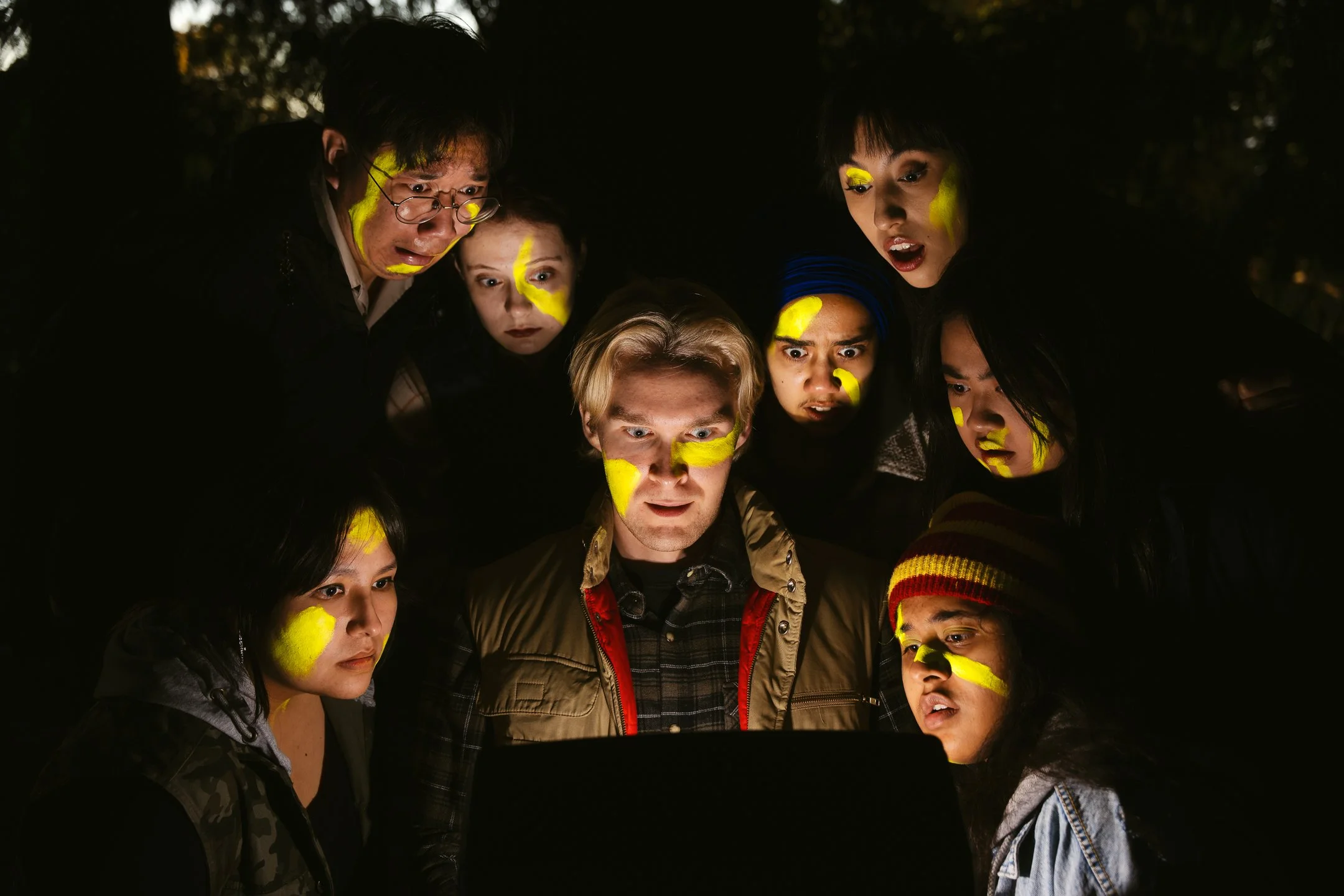Liminal Spaces: a Digital Play Trilogy - Review
/Since watching Cooking for Grief at the 2021 Vancouver Fringe Festival, I’ve been curious to see what alma matters productions does next. I got my answer in Liminal Spaces, a trilogy of new one-act plays presented in support of the CDA Institute Afghan Refugee Program, where 20% of ticket sales were donated.
Liminal Spaces is a piece of theatre, filmed by multiple cameras, in one take. It is an ambitious hybrid of media, in and of itself a liminal space between theatre and film. Viewed by livestream, audiences consume a piece of theatrical media from wherever they’d like—viewing theatre, but not at the theatre. We are also in a stage (ha, pun intended) of a global pandemic wherein theatres can be opened, but at limited capacity, necessitating hybrid works such as this. Moreover, each of the three one-act plays focuses on discussions between two people, examining the liminal spaces of human relationships.
The show opens with DISCORd, a conversation between Sarah Marchand, playing a pianist at what she thinks is a business dinner, and Anand Rajaram, a powerful man who could hire her, but preys on her instead. That power gap, that space between them, widens as Marchand, tensely navigating their talk and choosing her words very carefully, realizes she was invited to this dinner under false pretenses. It’s a dynamic familiar to all women and femmes. The tension steadily escalates, only to go nowhere in the end. While that’s realistic—I mean, even if you want to punch a creep in the face, you know damn well you won’t—it felt, narratively, strange. The tension didn’t diffuse in a way that made for a solid ending. I was left wondering, “Oh, that’s it?”
I am, however, possibly just unsatisfied with the ending because Rajaram’s portrayal of a skeevy, manipulative misogynist was so convincing that I just wanted to see bad things happen to him. Every single movement, every flicker of his eye, was spot on. I indulged in the full benefit of watching this digitally by yelling at my screen about how much I despised him.
Our second act is Mother, wherein a woman who believes she is about to die, played by Aida Keykhaii, examines fear, family, and mortality with her dead mother, played by Maryam Mahdavi. Keykhaii acts her heart out through a melodramatic script, but, opposite Mahdavi’s strange baby voice, this play just fell flat for me. I think the baby voice was meant to convey Mahdavi’s love and care—to reaffirm her motherhood—she’s talking to her daughter as if she’s a child, because her daughter is her child—but instead the tone of voice felt infantilizing, and not in a way that was effective or served the script.
Pure tragedy is hard to do in a one-act play. It’s difficult to provide adequate context to truly immerse the audience in the tragedy within 20 minutes. The script spends too much of its time repeating itself, and not enough time elaborating on why we should care that it’s repeating itself.
Also—why was half of Mahdavi’s hair in a braid, and half of it down? Is it meant to show that her life ended so suddenly that she couldn’t finish her braids? Is it, in itself, a liminal space between completeness and incompleteness? Is it because she is a ghost, speaking to a living person, in a liminal space between life and death? I feel like that stylistic choice, and the play in general, are trying to say something, but I can’t grasp what, and perhaps I shouldn’t be so distracted by a costume choice.
The trilogy is ordered appropriately—we begin with a piece that gradually builds tension, then we move to a slower, sadder, more contemplative show, and finally, we close out with an absolute burst of energy and life, where the production truly shines.
MPDG (Manic Pixie Dream Girl) is a piece of metafiction, featuring Nathan Taylor as a sad, male playwright with writer’s block, who works alongside his fantastical Manic Pixie Dream Girl, Annick Sheedy McLellan, to write a play about their romantic relationship.
The result is that both these roles are very demanding for a one act show, asking for a huge demonstration of range. When Taylor is alone onstage, the monologues feel a bit flat, but once McLellan joins him, the two have so much energy together to work off of, and the play really starts to work. The weirder the script got, the more into it I got. The note I wrote to myself during my viewing was, “this is like if Ruby Sparks did drugs with Charlie Kaufman,” which, to be clear, is a very good review from me. Taylor and McLellan just seemed like they were having fun in these roles, which I absolutely loved seeing.
MPDG also truly utilizes this hybrid film/theatre medium. The language of theatre and the language of film were both present and applied in compelling ways. At one point, we shift from shooting in black and white to shooting in colour, and it’s extremely satisfying to watch. The use of music—stereotypical sad music when Taylor is moping, and bright, sunny music when he and McLellan are writing a love story—was spot-on, and added a fascinating layer to this already fascinating script. I loved it. It was self-aware, self-effacing, and very funny. I loved what it had to say about writing, misogyny, and tropes. It was the perfect way to land on a satisfying conclusion of three interesting plays.







